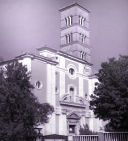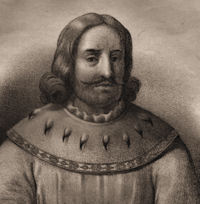Lent: March 2nd
Wednesday of the Third Week of Lent
Other Commemorations: Bl. Charles the Good, Martyr (RM)
» Enjoy our Liturgical Seasons series of e-books!
"Do not imagine that I have come to abolish the Law or the Prophets. I have come not to abolish but to fulfill. Amen, I say to you, until heaven and earth pass away, not the smallest letter or the smallest part of a letter will pass from the law, until all things have taken place. Therefore, whoever breaks one of the least of these commandments and teaches others to do so will be called least in the Kingdom of heaven. But whoever obeys and teaches these commandments will be called greatest in the Kingdom of heaven."
| The Station, at Rome, is in the church of St. Sisto Vecchio. It was built in the 4th century, and was one of the first parish churches in Rome and was known as the Titulus Crescentianae. Tradition claims that it was founded by Pope Anastasius I. |  |
Meditation - Baptismal Graces and Obligations
Like the neophytes of the early Church, we now seek to stir up in our hearts the grace which we received at our baptism. We are the children of God and the heirs of the kingdom of heaven. If we prove true to the vows we made at our baptism, we shall hear that blessed invitation on the day of judgment: "Come ye blessed of My Father, possess you the kingdom prepared for you from the foundation of the world." How eternally thankful to God we shall then be for having incorporated us into Himself and His Church through baptism!
By baptism we were incorporated in Christ as a member of His body, or as a branch of the vine. Christ lives in His members as a vine lives in its branches. What is done to the members of Christ, then, is done also to Him. "This is My commandment, that you love one another as I have loved you" (John 15:12). We shall all be judged by the degree of charity we practiced with regard to our neighbor.
"As long as you did it to one of these My least brethren, you did it to Me" (Gospel). It is a spiritual work of mercy to pray for sinners and to undertake sacrifices for them that they may find the grace to return to God. Since they are still members of the same body, although diseased, we feel a responsibility for their conversion. We become even more conscious of this responsibility during Lent. The Lord has assured us, "I desire not the death of the wicked, but that the wicked turn from his way and live" (Ezech. 33:11). — Excerpted from The Light of the World by Benedict Baur, O.S.B.
Things to Do:
- Today's Gospel provides the basis for the corporal works of mercy: feed the hungry; give drink to the thirsty; clothe the naked; harbor the harborless; visit the sick; ransom the captive; bury the dead. Discuss this Gospel with your children — this is an important truth that will guide them in charity all their life. Give practical examples: if he obeys his parents, shares a toy with his brother or sister, or gives alms to the poor, then he is doing all these loving things to Jesus Himself.
Blessed Charles the Good
Count Charles of Flanders, was called "the good" by the people of his kingdom. They named him for what they found him to truly be. He was the son of St. Canute, king of Denmark. Charles was just five years old when his father was murdered in 1086. When Charles grew up, he married a good young woman named Margaret. Charles was a mild and fair ruler. The people trusted him and his laws. He tried to be an example of what he expected the people to be.
Some nobles accused Charles of unjustly favoring the poor over the rich. He answered kindly, "It is because I am so aware of the needs of the poor and the pride of the rich." The poor of his realm were fed daily at his castles.
Charles ordered the abundant planting of crops so that the people would have plenty to eat at reasonable prices. Some wealthy men tried to hoard grain to sell at very high prices. Charles the Good found out and forced them to sell immediately and at fair prices. An influential father and his sons had been reprimanded by Charles for their violent tactics. They joined the little group of enemies who now wanted to kill him.
The count walked every morning barefoot to Mass and arrived early at the Church of St. Donatian. He did this in a spirit of penance. He longed to deepen his own spiritual life with God. His enemies knew that he walked to church and also that he prayed often alone before Mass. Many people who loved Charles feared for his life. They warned him that his walks to St. Donatian could lead to his death. He replied, "We are always in the middle of dangers, but we belong to God." One morning, as he prayed alone before the statue of Mary, his attackers killed him. Charles was martyred in 1127.
>—Excerpted from Holy Spirit Interactive
Patronage: counts; Crusaders; diocese of Burges, Belgium
Symbols and Representation: nobleman with a purse and a sword; depicted after his martyrdom in the cathedral; sword
Highlights and Things to Do:
- Read more about Bl. Charles:
- His remains are in the Sint-Salvatorskathedraal or Saint-Salvator Cathedral of Bruges, Flanders, in present-day Belgium.
 Saturday of the Second Week of Lent
Saturday of the Second Week of Lent
Station with Santi Marcellino e Pietro al Laterano (Saints Marcellinus and Peter):
The Station is in the church of Sts. Peter and Marcellinus, two celebrated martyrs of Rome under the persecution of Diocletian. Their relics were brought to the church in 1256, and the church was restored the same year on order from Pope Alexander IV. Santi Marcellino e Pietro al Laterano is a Roman catholic parish on the Via Merulana at the intersection with via Labicana. Their feast day is June 2..
For more on Santi Marcellino e Pietro al Laterano, see:
For further information on the Station Churches, see The Stational Church.






